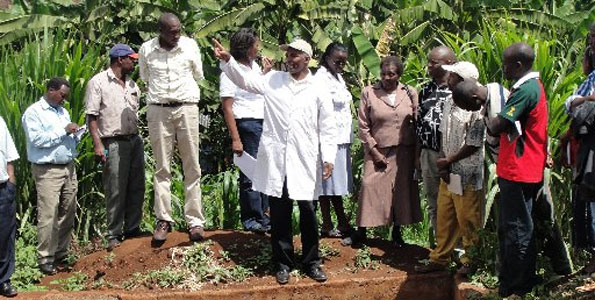His farm is the subject of interest for farmers’ delegations coming from across the Country. It is not because he has huge tracts of land or a large herd of cattle that draws people to his farm, in fact, quite the opposite: It is because of the way he manages to raise his cows on a tiny piece of land and, which produce an impressive amount of milk.
With only quarter of an acre, Mr Lawrence Munyua has worked out his math and has 41 grade cows in Ndenderu Village of Kiambu East District. In a day, he milks about 250 litres of milk, which has provided him with a good livelihood, earning him a cool Sh5,500 daily and which translates to a gross of Sh165,000 monthly.
“I commenced my venture by buying two cows at Sh2,000 in 1982. I then built them a shed worth Sh1,500,” says the man who has been in the business for 26 years. By 1994, he had a herd of 60 grade cows but owing to cost of managing them, he settled for a lesser number.
Today, I maintain a herd of 40 dairy cows, which is easier and more profitable to manage on the kind of land I have,” he says.
A teacher by profession, Mr Munyua retired in 1994 and settled for fulltime dairy farming. Owing to the unique case study his farm has become known for; he often receives eager farmers from across the country. And from them he earns an extra coin from the Sh300 fee that he charges each.
“I always urge small-scale farmers to visit me or any other developed farmer. It is the only way they can get knowledge about good farming practices,” he says. On our visit to his farm, we encountered Mr Munyua in a session with over 500 visiting farmers from Narok, Murang’a, Nyandarua, Kirinyaga and Nyeri districts.
Despite his peers using the traditional hand milking method, he employs an electric milking machine. “This makes my work very efficient and easy; hence, I employ less labour. I have three permanent employees and three casuals.
All I do is monitoring the operations,” he says. This also gives him time to lecture visiting farmers on how to improve their activities.
“You don’t need a high grade cow to produce more milk; take good care of your cow by feeding it properly and having regular check-ups from a veterinary officer,” he says.
To ensure food security for his herd, he has leased three acres of land where he plants Rhodes grass, Lucerne and Napier grass. “Storage of feeds is very important as it secures the future. I always ensure I have enough in my silo to last me six months,” he says.
He adds that the daily diet of each of his animals consists of five kilogrammes of dry grass, seven of silo, two of chicken litter and one of maize jam and bran. Whereas many farmers feed their cows throughout the day, he only does it twice – at 4.30am when milking and later at 3pm, also when milking.
“My cows get proteins from silage, carbohydrates from dry grass, vitamins from fresh garden weeds and mineral salts in the ratio of 2:1:1:0,” he says.
He points out that silage is the most important feed to him. Silage is fermented, high-moisture fodder that can be fed to cattle and sheep. It is fermented and stored in a process called silaging, and is usually made from grass crops, including maize or sorghum or other cereals, using the entire green plant.
It is made either by placing cut green vegetation in a silo, or by piling it in a large heap covered with plastic sheet, or by wrapping large bales in plastic film. Mr Munyua delivers his milk to the Kiambaa Dairy Farmers sacco in the morning and sells it to locals in the evening at the nearby Ndenderu shopping centre.
He works with his wife, Mrs Rosemary Mukami, and one of his sons. He wakes up before 4:30am to supervise milking and feeding of the animals. The farmer also breeds his own cows:
“Breeding is very important to ensure quality heifers that can give good results. I undertake my own artificial insemination and decide on the breed I want for my animals,” he says.
But dairy farming is not without its challenges, he says. High inflation has not spared him as prices of various commodities have risen drastically. Notably, is dairy meal which is now costing Sh1,200 up from Sh900. “Mineral salt prices have risen to Sh350 up from Sh250 last year for a 2.5 kilogramme stone the cows lick.
Fuel prices have affected me, especially in the transportation of feeds and sawdust for the cows’ shed,” he adds. Then there is the poor road network, especially during the rainy season when transporting milk and getting feeds becomes a nightmare. Mr Munyua advises farmers on time. He says it is important in the running of a business.
“If you want to be a successful dairy farmer, you must realise it is engaging and requires dedication,” he advises. It is also important to invest in technology to cut on costs, he says.









